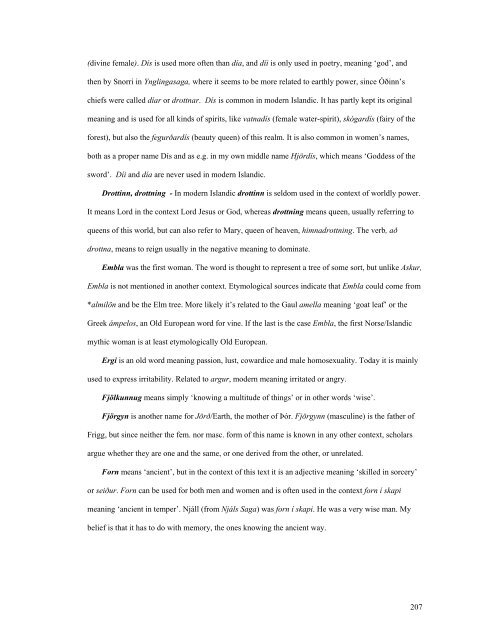You also want an ePaper? Increase the reach of your titles
YUMPU automatically turns print PDFs into web optimized ePapers that Google loves.
(divine female). Dís is used more <strong>of</strong>ten than día, <strong>and</strong> díi is only used in poetry, meaning ‘god’, <strong>and</strong><br />
then by Snorri in Ynglingasaga, where it seems to be more related to earthly power, since Óðinn’s<br />
chiefs were called díar or drottnar. Dís is common in modern Isl<strong>and</strong>ic. It has partly kept its original<br />
meaning <strong>and</strong> is used for all kinds <strong>of</strong> spirits, like vatnadís (female water-spirit), skógardís (fairy <strong>of</strong> the<br />
forest), but also the fegurðardís (beauty queen) <strong>of</strong> this realm. It is also common in women’s names,<br />
both as a proper name Dís <strong>and</strong> as e.g. in my own middle name Hjördís, which means ‘Goddess <strong>of</strong> the<br />
sword’. Díi <strong>and</strong> día are never used in modern Isl<strong>and</strong>ic.<br />
Drottinn, drottning - In modern Isl<strong>and</strong>ic drottinn is seldom used in the context <strong>of</strong> worldly power.<br />
It means Lord in the context Lord Jesus or God, whereas drottning means queen, usually referring to<br />
queens <strong>of</strong> this world, but can also refer to Mary, queen <strong>of</strong> heaven, himnadrottning. <strong>The</strong> verb, að<br />
drottna, means to reign usually in the negative meaning to dominate.<br />
Embla was the first woman. <strong>The</strong> word is thought to represent a tree <strong>of</strong> some sort, but unlike Askur,<br />
Embla is not mentioned in another context. Etymological sources indicate that Embla could come from<br />
*almilön <strong>and</strong> be the Elm tree. More likely it’s related to the Gaul amella meaning ‘goat leaf’ or the<br />
Greek ámpelos, an Old European word for vine. If the last is the case Embla, the first Norse/Isl<strong>and</strong>ic<br />
mythic woman is at least etymologically Old European.<br />
Ergi is an old word meaning passion, lust, cowardice <strong>and</strong> male homosexuality. Today it is mainly<br />
used to express irritability. Related to argur, modern meaning irritated or angry.<br />
Fjölkunnug means simply ‘knowing a multitude <strong>of</strong> things’ or in other words ‘wise’.<br />
Fjörgyn is another name for Jörð/Earth, the mother <strong>of</strong> Þór. Fjörgynn (masculine) is the father <strong>of</strong><br />
Frigg, but since neither the fem. nor masc. form <strong>of</strong> this name is known in any other context, scholars<br />
argue whether they are one <strong>and</strong> the same, or one derived from the other, or unrelated.<br />
Forn means ‘ancient’, but in the context <strong>of</strong> this text it is an adjective meaning ‘skilled in sorcery’<br />
or seiður. Forn can be used for both men <strong>and</strong> women <strong>and</strong> is <strong>of</strong>ten used in the context forn í skapi<br />
meaning ‘ancient in temper’. Njáll (from Njáls <strong>Saga</strong>) was forn í skapi. He was a very wise man. My<br />
belief is that it has to do with memory, the ones knowing the ancient way.<br />
207


